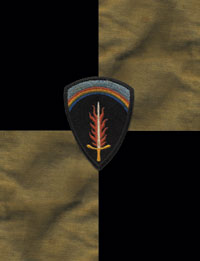 |
→ June 2004 Contents → Column
|
 | |
America's Turning Point: Normandy & World War II Endowed Excellence Fund
June 2004
|
|
Carolyn Peterson Braselton Townsend never knew her father. She was only three months old on June 6, 1944, when Capt. Everett Vinson Peterson died a hero on Omaha Beach. According to an officer on the scene that day, "Pete" Peterson was killed by an exploding shell just 15 minutes after landing as part of the Allied invasion of Western Europe during World War II.
Only six days earlier, Peterson had written his parents a long letter. "I've really been homesick the last couple of weeks," he wrote. "We haven't been too busy and so I've had a lot of time to think about home, Bunnie [Peterson's wife], and everyone. Even the thought of my return sends my heart beating faster - what a day that will be!"
"I don't want him to have given his life in vain," Townsend says, explaining why the preservation of World War II history is so important.
The Dallas resident is not alone in her sentiments. A number of UT Austin supporters have joined forces behind America's Turning Point: Normandy & World War II Endowed Excellence Fund. The endowment provides funds for the CAH's Studies in American Military History initiative, which includes an outreach component in addition to the archive, and the Normandy Scholar Program, an intensive undergraduate educational experience in the College of Liberal Arts. Major contributors to the fund are Frank Denius of Austin, a highly decorated World War II veteran, and Houstonians Jim and Betsy Reichert and DeWitt and Muffy Waltmon.
The Normandy Scholar Program, established at UT in 1990, selects students for concentrated coursework on the historical, cultural, and intellectual influences that led to the war. The program culminates in a three-week trip to Europe, during which students visit monuments and battlefields, walk the beaches of Normandy, and interact with survivors of the war.
A key player in the development of America's Turning Point is Tom Hatfield, dean of UT's Division of Continuing and Extended Education and a military historian who is a CAH Fellow. Hatfield coordinates CAH'S World War II tours program, which includes excursions to the beaches of Normandy. During these tours, Hatfield provides commentary on various battlefield events. In addition to the tours, CAH is collecting the wartime papers of veterans of World War II.
"I am encouraged by the very positive and enthusiastic response we have received from a wide variety of individuals who feel strongly that this is an important program that deserves support," says CAH director Dr. Don Carleton.
On one of CAH'S recent trips, Carolyn Townsend laid a wreath in honor of her father at the American Cemetery overlooking Omaha Beach.
"It was emotional for me," she says. "For the first time, I was able to publicly acknowledge my father and what he did. It's taken me a lifetime to feel okay about it all."
For more information about America's Turning Point: Normandy & World War II Endowed Excellence Fund, contact Becky Prince in the College of Liberal Arts at 512-475-9763. For information about CAH-sponsored World War II travel programs, contact Dr. Tom Hatfield at 512-471-2777.
© Sheila Allee and David Dettmer
|
Back to June 2004 Contents |
|
 The letter was one of the last he wrote and a treasure that Townsend kept until recently when she gave all of her father's correspondence, photographs, and family scrapbooks detailing their World War II experience to the Center for American History's (CAH) archive for Studies in American Military History at the University of Texas at Austin..
The letter was one of the last he wrote and a treasure that Townsend kept until recently when she gave all of her father's correspondence, photographs, and family scrapbooks detailing their World War II experience to the Center for American History's (CAH) archive for Studies in American Military History at the University of Texas at Austin..